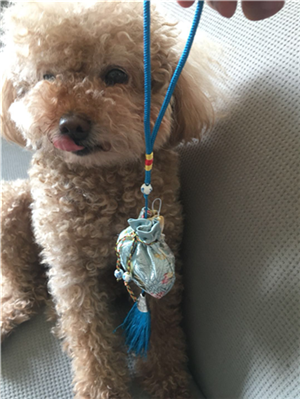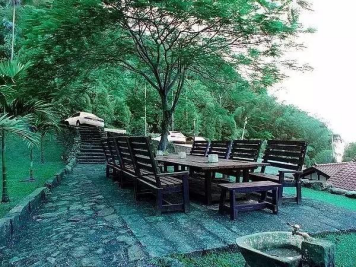


【编者按】正值端午小长假,在中国的外国朋友们会怎样度过这样一个中国传统节日?他们对端午习俗有怎样的看法?东方网英文版收到几位老外的来稿,他们亲笔写下了自己对于端午节的感受。我们来听听出生在台湾的美籍华人王君姿(Annie Wang)的端午节故事,或许也能勾起你的一丝乡愁。
The fifth day of the fifth lunar month, the Dragon Boat Festival, is a very special day both in Mainland China and Taiwan. The story about the Dragon Boat Festival came from the poet Qu Yuan who was accused of treason, and the King dismissed and exiled him. He jumped into the Miluo river after hearing the news that Qin troops had finally conquered Chu's capital. Locals raced out in their boats to rescue him, and when they couldn’t find him, they rode the long canoe and threw rice balls into the river so fish would’t eat him.

The Dragon Boat Festival has many traditions. One of them is for Children to wear scented sachets to ward off evil. This year, the staff from Tongrengtang came to our Xintiandi community to teach us how to make scented sachets filled with 7 Chinese herbs and aromatic ingredients, though we don’t need to do the embroidery part. The most popular tradition is, without a doubt, the eating of zongzi. My favorite zongzi, which is also my daughter’s favarite, is the small-sized zongzi made by Lvbolang Restaurant in Yu Garden. We can take one such zongzi down in one bite.

The festival also brings back my childhood memory of living in the little village called Zhushan (bamboo mountain) town in Nantou county, Taiwan, where bamboo trees are spread all over the mountains and bullfrogs are heard croaking and cicadas heard chirping. Midsummer time, it’s for us to see the dragon boat races and make rice dumpling! Calling it true summer begins.
It’s mom and grandma sitting in the courtyard with buckets of pearly white rice and fresh green bamboo leaves soaking wet and delicious brown soy sugar braised fatty pork and red bean pastes as fillings. Rice and delicious treasures buried in rice and wrapped in the beautifully fragrant green bamboo leaves will be tied into a cube with hay straw, then cooked in the mountain spring water for at Least an hour then it’s done. One rice dumpling is enough for a meal for one person. Despite the fear of fatty port, I still love eating zongzi till this day and thinking about it makes my mouth watered because of the fragrance of the green bamboo leaves released once the ropes are untangled.
All these years living in China to learn about dragon boat festival story made me understand my heritage and imagination bring me back to the the days of the Chinese traditional livelihood. The love of the additional Chinese cuisine makes me love this holiday!
农历五月初五是端午节,在大陆和台湾都是个很特别的节日。端午节是纪念屈原投江的传统节日。伟大诗人屈原因楚王听信谗言而被流放,在亲眼目睹国家灭亡后抱石投汨罗江自尽,江上的渔夫和岸上的百姓,听说屈原大夫投江自尽,都纷纷来到江上,奋力打捞屈原的尸体,人们纷纷拿出家中的粽子投入江中,让鱼吃了就不会去咬屈大夫尸身。
端午节有很多传统习俗。其中一个习俗是让孩子佩戴香囊辟邪。今年,我们赶上了同仁堂的师傅来我们新天地社区教大家做安神香囊的活动。虽然没有绣花缝制,但我们了解到原来这种香囊含有7种香料和中药。当然,端午节最受欢迎的习俗还是吃粽子了,呵呵,我和我女儿现在最爱的是绿波廊的小脚粽,可以一口一个。
每次过端午节,也都会勾起我童年的记忆,那是在台湾玉山山脉底下的南投县竹山镇,有遍山遍野的竹林子与牛蛙叫与蝉鸣。那是仲夏时分,是看龙舟赛的日子,也是做粽子、吃粽子的节日,是夏天的伊始。
端午节是看着婆婆和妈妈坐院子里小凳子上围着几个锅如小珍珠般的米,几叠泡着水的竹叶子,还有美味的红烧肉以及香甜的红豆沙。粽子用麦秆包裹成三角状后用山泉水煮上一小时就大功告成了,一个粽子够一个人一顿饭了。现在仿佛还可以依稀闻到青绿色竹叶子的清香包裹着晶莹剔透的,白色软糯香甜的米粒透着红豆沙的粉红,或是嵌着已化了透明的肥肉。我到如今还是特爱吃粽子,就是因为满满拉开绳子解开包裹着的粽叶,深深的吸蕴着那竹叶清香,让从小怕肥肉的我还是爱它。
回到中国生活这些年,让我重新认识端午节的意义,这些丰富的传统文化活动,可以让我想象到古时候的生活故事情节,还有自己中国血统里对自己传统食物的恋倦喜爱,使端午节于我而言更胜于西方的节日。